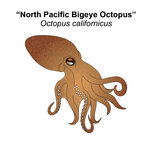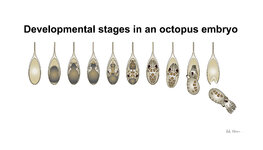Dear cephalopod community,
This my first post but I've been lurking on this forum for awhile. My name is Adi Khen and I'm a PhD student at the Scripps Institution of Oceanography, UCSD. I actually study coral reef ecology, but in my spare time I took up animal husbandry and have completely fallen in love with octopuses! I've been raising the deep sea species Octopus californicus-- commonly known as the "North Pacific Bigeye," collected from a trawl on one of our research vessels. Our octopuses are in chilled water on flow-thru (approx. 8 degrees Celsius) and are usually fed thawed fish. They're supposedly more social than other species and can live together (but, mind you, the tank is >100 gallons) and best of all are charismatic, clever, and just *so* cute. I've spent a lot of time with them, both observing them and interacting with them, and have written a couple stories about my experience which I wanted to share with you if that's okay!
Please see here: Raising an ‘Alien’ from Earth
And this was my original story: The Story of My Octopus
At this point I feel like I owe it to my 'pet' octopuses to promote public understanding and appreciation for these creatures <3 and I've received positive feedback so far but I'd love to hear any of your thoughts too, especially as experts/hobbyists! I'll try to keep you updated about our latest bunch; one of the larger females laid eggs about a month ago and although there's been no visible development yet, I'm thinking it might take much longer for this deep-sea species...
Oh, and I also make digital scientific illustrations! I've drawn this species, as well as a general diagram of octopus embryonic development and a tentacle-tribute which I'm attaching here in case you're interested
Thanks for reading,
Adi
This my first post but I've been lurking on this forum for awhile. My name is Adi Khen and I'm a PhD student at the Scripps Institution of Oceanography, UCSD. I actually study coral reef ecology, but in my spare time I took up animal husbandry and have completely fallen in love with octopuses! I've been raising the deep sea species Octopus californicus-- commonly known as the "North Pacific Bigeye," collected from a trawl on one of our research vessels. Our octopuses are in chilled water on flow-thru (approx. 8 degrees Celsius) and are usually fed thawed fish. They're supposedly more social than other species and can live together (but, mind you, the tank is >100 gallons) and best of all are charismatic, clever, and just *so* cute. I've spent a lot of time with them, both observing them and interacting with them, and have written a couple stories about my experience which I wanted to share with you if that's okay!
Please see here: Raising an ‘Alien’ from Earth
And this was my original story: The Story of My Octopus
At this point I feel like I owe it to my 'pet' octopuses to promote public understanding and appreciation for these creatures <3 and I've received positive feedback so far but I'd love to hear any of your thoughts too, especially as experts/hobbyists! I'll try to keep you updated about our latest bunch; one of the larger females laid eggs about a month ago and although there's been no visible development yet, I'm thinking it might take much longer for this deep-sea species...
Oh, and I also make digital scientific illustrations! I've drawn this species, as well as a general diagram of octopus embryonic development and a tentacle-tribute which I'm attaching here in case you're interested
Thanks for reading,
Adi







